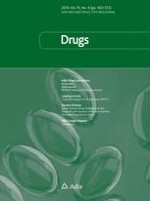Published in:

01-08-2004 | Therapy In Practice
Managing Immunogenic Responses to Infliximab
Treatment Implications for Patients with Crohn’s Disease
Authors:
Peter D. Han, Dr Russell D. Cohen
Published in:
Drugs
|
Issue 16/2004
Login to get access
Abstract
Infliximab is a tumour necrosis factor (TNF)-α antagonist that has revolutionised the treatment of Crohn’s disease and rheumatoid arthritis. However, infliximab therapy can be complicated by a variety of adverse reactions. Acute infusion reactions occur during or shortly after infusion and typically consist of fever, chills, nausea, dyspnoea and headaches. Delayed reactions, characterised by myalgias, arthralgias, fever, rash, pruritus, facial, hand or lip oedema, dysphagia, urticaria, sore throat and headache may occur 3–12 days after infusion. Although the mechanisms of these reactions are not yet clearly defined, emerging evidence indicates that these reactions may be associated with the immune response against infliximab and the development of antibodies to infliximab.
A number of studies have identified protective factors that may minimise adverse reactions, presumably related to the immune response against infliximab. Factors that may be protective by helping to establish immune tolerance for the foreign infliximab protein include concomitant administration of immunomodulators or corticosteroids, starting infliximab therapy with a 0, 2, 6-week induction regimen, maintenance dose administration with infusions every 8 weeks or less, and avoiding long periods between infusions.
Infliximab therapy also may have other immunological consequences. There is evidence that infliximab may impede the appropriate immune response to a number of pathogens, prohibiting its use in patients with active infections. In addition, patients should be screened and appropriately treated for tuberculosis before initiating infliximab therapy. The development of autoantibodies, such as antinuclear antibody or anti-ds-DNA, has also been described with infliximab therapy, although the development of clinical lupus-like syndrome is rare. While there is a theoretical risk of increased rate of malignancies due to antagonism of TNFα, to date there is no clear evidence of such an effect. In addition, cardiac and neurological adverse events associated with infliximab therapy have been described. The mechanism for these adverse events is unclear.
In summary, infliximab therapy can be an effective treatment for Crohn’s disease; however, a number of immunological consequences and adverse events may complicate the infusion of this agent. Appropriate prophylaxis and therapy of these adverse reactions will allow infliximab to be used safely in the vast majority of patients.